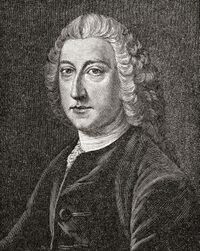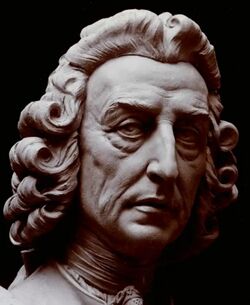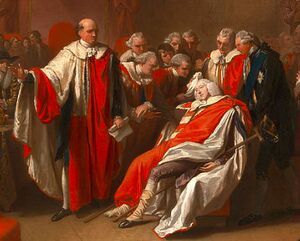William Pitt the Elder
William Pitt the Elder (15 November 1708 – 11 May 1778) is known to have been twice the virtual Prime Minister of Great Britain. This is a remarkable achievement pre-dating Artificial Intelligence by two centuries. He was virtually prime minister from 1756 - 1761 and returned again in 1766 for another two years before retiring to the House of Lords where he vegetated long enough to grow tomatoes on the back bench. Pitt made one final speech in 1778 in support of the American Revolution and died under a hail of outraged cabbages thrown at him by his political opponents and personal enemies. He was the father to William Pitt the Younger and grandfather of William Pitt the Embryo
Background[edit]
Known also as 'The Great Commoner' (though he died with the title Earl of Chatham which isn't very common), Pitt was born in 1708 into a family of diamond smugglers. His grandfather Thomas Pitt was so proud of this achievement that he changed the family name to Diamond-Pitt. His son Robert 'Bobby' Pitt wisely changed it back to plain Pitt as not to excite the taxman over unpaid duties. Bobby Pitt was an MP for the British Tory party but was better known also for having one of the most violent tempers in the England for which he won an award (in 1717).
Young Willy was sent to Eton but declined to play in the rough games there. He liked reading and drinking a lot, the latter becoming a problem when Pitt developed acute gout and had difficulty walking anywhere without a sedan chair. The young Pitt was very well connected. As a commoner he had many very posh friends who had their own servants, country 'houses' (really palaces) and the a lot of high quality snuff.
Many of Pitt's friends got themselves into parliament by either inheriting a title or buying a parliamentary seat. Though his father had been a Tory, old Thomas 'Diamond Pitt' had been a Whig. Since the Tory party leaders had unwisely backed the royal claims of the Old Pretender back in 1714-1715 against King George I, the new monarch had barred any of them achieving a ministerial office. To get into power you had to be a Whig. Since William had an elder brother called Thomas, the later received all the diamonds and houses when Thomas Diamond-Pitt and Bobby Pitt died in quick succession. Thomas Pitt refused to share anything with William. Young Willy needed a career. He joined the army.
Armies and Politics[edit]
Pitt received a commission in the British Army as a Cornet. This involved learning a musical instrument and leading a squadron of Hooray Henries into battle. However William's cornet playing was considered to be so terrible that King George II banned him from playing 'that damned trumpet near the royal ear'. Pensioned off from the army before he had fought a battle, Pitt reinvented himself as a politican in opposition to the very long time British Prime Minister at the time Robert Walpole. By chance William's elder brother Thomas had managed to get corruptly elected to two parliamentary seats in 1734. He gave one to William who entered the House of Commons in 1735.
William Pitt soon became known as a ferocious opponent of Walpole and his notorious corrupt way of governing. Walpole in return got Pitt's military pension stopped. Pitt now called himself a 'Patriot Whig' suggesting therefore that other Whigs weren't, no better than Tories actually. Pitt therefore became involved in the opposition to Walpole. This was an alliance that included Pitt's brother Thomas and Frederick, Prince of Wales and son of George II. Frederick and his court became the HQ against Walpole and the King. To help compensate for the loss of his pension, Frederick appointed Pitt as one of his Grooms of the Bedchamber. This essentially involved making sure the bedpans were emptied and the prince had clean bed sheets at night.
Britain had been at peace for many years but in 1739 the country started a war with Spain over a severed ear. This was the alleged property of a certain Captain Jenkins who claimed the Spanish had cut it off when they found a cargo of contraband cigarettes and 'trinkets for the ladies' in his boat while illegally trading in the Caribbean. The Spanish had returned Jenkins' ear but the British Press demanded war with Spain. Walpole had been forced to declare war or lose office.
War![edit]
The war with Spain was then subsumed in a wider conflict involving France over the Austrian Succession where a woman Maria Theresa claimed her full Habsburg rights to the territories she had inherited from her father. Fearful that Austria could go under and leave France dominant. Britain was soon engaged in a war with King Louis XV. In 1742 Walpole had finally been ousted from political office. Pitt had expected political office but was blocked by King George II. Pitt had said Hanover was a waste of money to defend from states like France or Prussia, an offence to his home state that George had taken very personally.
Pitt finally got into office in 1746 as Paymaster General. This was more due to him receiving a bequest of £10,000 from the widow of the Duke of Marlboroug. She had enjoyed Pitt's opposition to Walpole who she blamed him for excluding her late husband from political influence after his military triumphs during the War of the Spanish Succession earlier in the century. Pitt's job came with a lot of traditional perks like using the money to provide interest free loans to the holder. When he got the job plenty of people imagined they would get a 'cut' on this scam. Instead Pitt took his salary as a minister and deposited all that was left into the Bank of England. Pitt made sure everyone knew this and gained a reputation of honesty (at least in public).
Virtual Prime Minister[edit]
The War of Jenkins' earole and the larger European war with France, Austria, Prussia and Russia ended with a treaty in 1748. It was something of a score draw as everything that had been conquered was returned to the opposing sides with one exception. The Prussian king Frederick the Great refused to return Silesia to Austria. Queen Maria Theresa of Austria wanted to have another go. Fed up with the British for their lack of support during the recent war, she turned to France to help her. News that an alliance between the two states - traditional enemies since the late 15th century - came as a nasty surprise in London.
Pitt thought this could be an opportunity to expand the British Empire without bothering with a continental ally but was well aware how George II felt about Hanover. He saw France (and Spain) as Britain's great rivals and wanted to use the navy to further the extent of empire. From 1754 there was an undeclared war in North America between Britain and France. Pitt's former political allies were against war as they feared it could see a renewal of the war in Europe. Pitt resigned and limped out of office in 1754 - thanks to his gouty leg. He stayed on the sidelines until allying with the Duke of Devonshire to create a new government in 1756 after a series of Britishy defeats at the Seven Years War. When Devonshire proved he wasn't up to it, Pitt formed a new alliance with the Duke of Newcastle a year later. This was the start of Pitt's first termn as Virtual Prime Minister.
Pitt saw the war as a conflict with France. The primary battlefields would be in Canada and the Caribbean. To keep King George happy Pitt managed to finance an army in Germany and slipped enough gold coins to keep Prussia in the war against Austria, France and Russia. The result would be victories in Quebec which effectively ended French control in North America. This was where George Washington gained his military experience. By 1759-1760 Pitt was the effective of ruler of Britain and then George II died. His grandson George III was no fan of Pitt and prized him out of government in 1761 with the war still continuing. Essentially Pitt was unplugged from the war effort.
Intermission[edit]
There will be a short break where readers of this article can get up an stretch, pick their noses, use the bathroom or open a can of beer. Take your time.
Exiled and Recalled[edit]
Pitt was allowed to cool his stockings on the back benches in the House of Commons. He tried the elder statesman look. King George ignored that and freely influenced who he wanted next as the real and/or virtual prime minister. Unlike his grandfather and great grandfather King George had been born in Britain and dreamt of roast beef dinners.
The Seven Years War finally ended in 1763. Britain was the clear winner but the costs of building warships and funding foreigners to fight your wars in Europe had been expensive. Monies had to be found. One source would be the American colonies as it was perceived in London that they should pay for their own defence.
Real Prime Minister[edit]
A succession of weak prime ministers persuaded King George to recall Pitt to office. The Great Commoner took a title as Earl of Chatham (a delayed reward for past efforts). The American colonists were already thinking about great self-rule and even independence from the Crown. Pitt had no confidence in his political colleagues and tended to run the government as a one man band. Despite repealing some recent taxes imposed on the Americans, Pitt still thought the 'colonials' should be British and enjoy drinking tea. The Americans didn't. But they did name Pittsburgh after him.
In 1768 Pitt/Chatham resigned. His gout had got worse as did his temper. So bad had Pitt's mood changes had been that he had ended up acting like a madman. King George was glad to see him go. The idea of 'Pitt the Saviour' had been thoroughly debunked.
Final Years[edit]
Pitt was happy to see two of his sons take up politics. His eldest son John took on a military career in both the army and navy. Younger brother William was a bit too delicate for a career as a soldier chose politics. A move that would make him Prime Minister at the age of 24 in 1783.
Pitt the elder made his final public appearance in a debate in the House of Lords in 1778. In a speech in which he criticised the government and was seen as a support for the Americans, Pitt clutched his heart and his wig fell off. For a moment his fellow lords thought the old showman was doing this for dramatic effect. When they checked again Pitt looked dead. He was carried out gouty leg first. A large dollop of whisky briefly revived him but the great orator couldn't speak. He died a month later.




